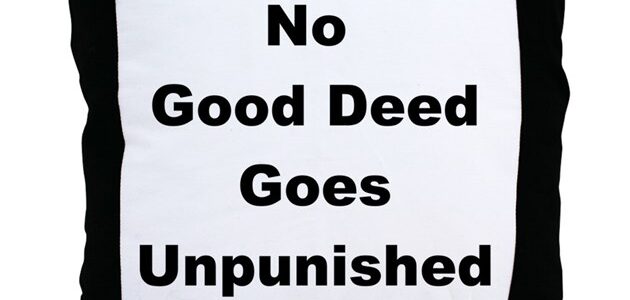I used to wonder why it was said, “No good deed goes unpunished.” If you are doing good you should be getting rewarded or at least a reprieve from punishment. Punishment is for bad deeds, not good ones, right? Not always…
Most of us have a real desire to help others or our community in some way. Maybe it is through our employment, our church, friendships or family the opportunity to help presents itself. With the best of intentions, we often jump in with both feet to help. We become emotionally invested in helping to solve a problem and we are willing to sacrifice personally or even sometimes financially to be part of the solution.
The decision to help and willingness to sacrifice is usually made almost immediately when someone shares a need. Maybe it is because it is someone very close or a situation that makes you feel an emotional connection. Whatever the reason, you jump right into the deep end of the pool to help.
Early on in the decision to help, you may not know of all the actual facts and circumstances. Generally, all information is from the person needing your help. Since each person’s perception is their reality, the facts and circumstances may be skewed. In fact, rarely do two sides share the exact same set of facts, the objective truth lies somewhere in the middle. Nonetheless, you are invested and ready to answer the call.
Now the problem solving begins, and you start uncovering additional facts and circumstances. You offer ideas, assistance, time and emotional support. You try to unravel the knot and find a solution that will HELP.
Sometimes that help causes you the most pain. Sometimes you find that the facts and circumstances presented were almost entirely self serving, and you can’t change the facts or solve the problem. Sometimes you have good facts and evidence, but the problem is still not one that can simply be solved.
You offered your help with confidence that you could help solve the problem, and an unwavering belief in the mission. When suddenly you gain more understanding, it becomes clear that you cannot solve the problem – you become the problem. There is no trophy or ribbon for all the emotion, sacrifice and time you spent trying to help. You were not able to reach the desired outcome, you are now the villain.
You are disappointed and upset, maybe with yourself, that you could not solve the problem. You might be upset that someone you trusted did not give you the truth, and that prevented you from making an educated decision about your ability to help.
Life isn’t fair, and we often do not get the outcome we desire. I do not believe it is because the world is corrupt or people are all mean and dishonest, I believe life simply was never designed to be fair. If we always get the outcome we desire that would mean life was perfect. How do you recognize happiness if you have never experienced sadness.
Maybe that is why they say, “No good deed goes unpunished.” For all your good intentions, you are now being punished by anger, retaliation, emotional distance and discord with someone you care or cared about deeply. Maybe you are embarrassed that you were fooled into helping the wrong person with the wrong mission. While your intentions were good and you did your best, in the end there is discord and disappointment – the punishment.
While I agree some good deeds don’t go unpunished, I have a career that offers me a ringside seat to some unimaginable tragedy born from good intentions. I also get to see people truly changed by those who were willing to reach out a hand to help. The gift is that feeling of knowing that you just made someone’s day, week, season, life a little better just out of kindness and an offer to help.
So as we continue to reach out our hands to help, remember that sometimes that help will go unappreciated and you will feel like no good deed goes unpunished. However, more importantly, many times the good deed results in good work with a good result. It is then we get the reward, we see the reward in someone else’s happiness, humbleness and appreciation for a deed well done.

